I'm always trying to juggle my family and work committments to figure out the best, and most productive, use of my time. Unfortunately, writing a post for my blog always ends up at the bottom of the list. It's not like I don't have things to say about television, publishing, or the writing process…or pet peeves to vent about, publishing scams to rant about or ridiculous emails to ridicule. My "For the Blog" file on my hard-drive is full of emails, links and tidbits. But between my deadlines, business meetings, and family obligations, I just haven't had the time to pay much attenton to this blog. I don't know how my friends Ken Levine and Bill Crider manage to post new material every day…
Other Random Posts
A Big Deal for THE DEAD MAN
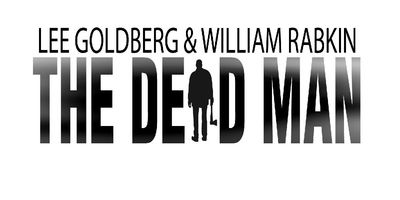 Okay, I can finally reveal some of the big news I've been dying to share with you…
Okay, I can finally reveal some of the big news I've been dying to share with you…
I am thrilled to announce that Amazon's Thomas & Mercer imprint has picked up THE DEAD MAN series in a unique and exclusive 12-book digital & print deal … with an option for more. But that's not all. Brilliance Audio will be also be rolling out their own editions of the books.
The five books that we've already published — FACE OF EVIL, RING OF KNIVES, HELL IN HEAVEN, THE DEAD WOMAN, and THE BLOOD MESA — will be re-released in the days leading up to Halloween … so keep your eyes peeled for great offers.
The sixth book in the series will be released in November and will be followed each month by another new adventure in the continuing saga of Matt Cahill, a man resurrected from the dead to battle evil among us that only he can see.
Amazon will also be releasing three-book compilations of THE DEAD MAN series in trade paperback (as well as in specially priced digital editions). The release dates of the first compilation, and the Brilliance Audio editions, have not been determined yet … but we’re hoping they'll be ready for Christmas.
Bill Rabkin and I will continue to run the series, which we're writing with a terrific group of action, horror, mystery, SF and western authors, like James Daniels, David McAfee, James Reasoner, Harry Shannon, Joel Goldman, Mel Odom, Jude Hardin, Lisa Klink, Mark Ellis, Matthew Mayo, Joe Nassise, Bill Crider, Matt Witten, Marcus Pelegrimas, Burl Barer, and Phoef Sutton.
And we couldn't have hoped for a better partner than Amazon’s Thomas & Mercer. I just returned from meeting with the Thomas & Mercer team (including editors Terry Goodman and Andy Bartlett) in Seattle and was blown away by their creativity, enthusiasm, and eagerness to see THE DEAD MAN reach its full potential. They get exactly what Bill and I are trying to do with this series.
And what is that, you ask?
We want to capture the spirit of the “men’s action adventure” paperbacks of the 70s and 80s – short, tightly-written books full of hard-boiled heroes, outrageously sexy women, wild adventure, and gleefully over-the-top plots – and reboot the genre for a new generation that maximizes the potential of the Kindle.
And with Thomas & Mercer behind us, I don't see how we can fail.
AWOL
Sorry I have been largely absent here lately — between jury duty (I'm going into my second week), a tight deadline on my next MONK book (due in October!), and editing THE DEAD MAN book series (with Bill Rabkin) – I haven't had much time for blogging. But I'll make up for it soon. I want to talk about my unusual experience writing KING CITY (my recently completed crime novel) and I'm eager to share some big news about THE DEAD MAN. And I'm sure I'll have some things to say about serving on a jury…
Adapting to Adaptations
Adapting a screenplay into a novel isn't easy. Author Jonathan Maberry, who has done it a few times himself, interviews the nominees for the Scribe Award for best adapted novel on his blog. Here's an excerpt:
BIG SCARY BLOG: What drew you to writing media tie-in books?
GREG COX: My not-so-guilty secret is that I would be watching these shows and movies, and reading the comics, even if it wasn’t my job. I grew up on sci-fi movies and comic books and such, and I still get a thrill out actually getting to write some of my favorite characters and series.
ROBERT VARDEMAN: I’ve done game tie-in novels in the Star Trek (TOS) universe and for such diverse games as Magic: The Gathering, MechWarrior:Dark Age and most recently, Pathfinder (a short story titled “Plow and Sword” is due to be posted on that website any time now). The pleasure of playing in someone else’s sandbox, maybe picking up a toy or two and examining it, then imagining something even more than already exists, is a wonderful challenge. As an author I have to play fair with the established material but find new ways to “make it my own” expanding what is there into a complete tapestry of a story. The challenge possibly generates the same feeling as a race driver surging around the course at high speeds. Adrenaline pumps, ideas flows and the actual writing is often done at close to the speed of that race driver–but without the catastrophic result if there’s a crash. Hopefully the checkered flag drops for both race and novel.
JONATHAN MABERRY: I got a call out of the blue. I was at home one Saturday night watching a monster flick (the outstanding Neil Marshall werewolf film, DOG SOLDIERS) when I get a call from a woman who says she’s a vice president with Universal, asking if I’d be interested in novelizing the remake of THE WOLFMAN. I had no idea I was on anyone’s radar for this and for a few seconds I thought I was being punked. When I realized that this was serious, I got very excited. I’ve always loved media tie-in novels. I had a shelf-full of them as a teenager –Murray Leinster (TIME TUNNEL, LAND OF THE GIANTS), Michael Avallone (THE MAN FROM .U.N.C.L.E., BENEATH THE PLANET OF THE APES) and others, and kept reading novelizations and books expanded-universe stuff. Among my favorites are the Buffy and Angel novels by Christopher Golden, Nancy Holder and John Passarella.
Since I did WOLFMAN, I’ve played with other tie-in stuff. I did a GI Joe novella (‘Flint and Steel’) for a collection called GI JOE: TALES FROM THE COBRA WARS edited by Max Brooks. And I do a lot of comic book work with Marvel, which involves writing characters and stories set in a well-established world not of my making. It’s all great fun.
Bathroom Reading Roundup
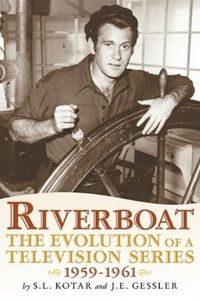 I can't resist buying books about the making of TV shows, even series I never watched or don't care for much, because I always learn something from them. Bear Manor is a small, niche publisher that churns out a lot of these books. The quality of the writing and research on the books is very hit-and-miss, but Bear Manor deserves a lot of credit for even bothering to print them. They're just about the only publisher out there turning out books on obscure and vintage TV series at an affordable price (one piece of advice, though, never buy a book about a TV series by James Rosin, you can always count on them to be awful).
I can't resist buying books about the making of TV shows, even series I never watched or don't care for much, because I always learn something from them. Bear Manor is a small, niche publisher that churns out a lot of these books. The quality of the writing and research on the books is very hit-and-miss, but Bear Manor deserves a lot of credit for even bothering to print them. They're just about the only publisher out there turning out books on obscure and vintage TV series at an affordable price (one piece of advice, though, never buy a book about a TV series by James Rosin, you can always count on them to be awful).
I particularly enjoyed Riverboat: The Evolution of a Television Series 1959-1961 by S.L. Kotar and J.E. Gessler, which chronicles the development and very short life span of the western, which starred Darren McGavin (at the same time he was starring in Mike Hammer) and Burt Reynolds. McGavin played the captain of the Enterprise…no, not the starship, but the riverboat…and Reynolds was his pilot. The two characters didn't get along and, as it turned out, neither did the actors. Reynolds was forced out after the first season.
Most books of this sort are written by diehard fans and read like the slobbering labors of love that they are. But this one is different. The authors are diehard McGavin fans, and did all this research as part of their website devoted to the actor, and while they admire the him, they aren't so wild about the show. They take a very, very critical eye. The show never found its footing conceptually, and an unusually high turn-over of writer-producers seemed to doom it from the start…
The writing, too, was a mixed bag of (over)experienced and novice writers. Most of the episodes were little more than standard Wagon Train plots transported to a riverboat setting. Few particularly stood out as rising above the rest, and as a whole, they failed miserably to create any significant characterization for [McGavin's character] or the crew. […]nothing rose head-and-shoulders over routine TV fare. Considering the premise, and Darren McGavin, this was disappointing to say the least.
And that's the nicest thing they have to say about the series. So you might be asking yourself — if the show was so mediocre, why write a book about it? And why should I read it? Well, if you are a student of TV as I am (even after writing and producing many TV series myself), it's always fascinating to read about the development, production, and fate of a show. And the authors don't skimp on details. The episodes are analyzed in depth and the authors add interesting asides about production. The book is also chock full of rare, never-before-published production stills. If you are a Riverboat or McGavin fan, you're going to love it.
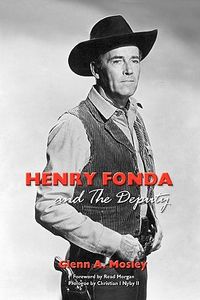 On the other end of the spectrum is Henry Fonda and The Deputy by Glenn Mosley. The 1959 series starred Fonda, then a major movie star, as U.S. Marshal and was created by Norman Lear and Roland Kibbee, who would go on to great success themselves. But despite the hoopla surrounding Fonda's decision to do a TV series, it was something of a bait-and-switch. He only appeared as the lead in six of the first season's 39 episodes and did cameos in the others. Most of the screen time was filled by Allen Case as his deputy. But viewers weren't tuning in to see Case and felt cheated…and rightly so. Fonda upped his participation to twelve episodes in the second season, but it was too late (though the network was supposedly willing to go for one more season).
On the other end of the spectrum is Henry Fonda and The Deputy by Glenn Mosley. The 1959 series starred Fonda, then a major movie star, as U.S. Marshal and was created by Norman Lear and Roland Kibbee, who would go on to great success themselves. But despite the hoopla surrounding Fonda's decision to do a TV series, it was something of a bait-and-switch. He only appeared as the lead in six of the first season's 39 episodes and did cameos in the others. Most of the screen time was filled by Allen Case as his deputy. But viewers weren't tuning in to see Case and felt cheated…and rightly so. Fonda upped his participation to twelve episodes in the second season, but it was too late (though the network was supposedly willing to go for one more season).
The book has some good information, but it's barely more than a magazine article padded out into book-length with actor biographies (which repeats lots of information already conveyed) and a very thin episode guide. If you're a big fan of The Deputy, you'll be disappointed by the lack of substance to this book. And if you've never heard of the show, there isn't anything here to really make it worthwhile to learn more.
Finally, there's Rawhide: History of Television's Longest Cattle Drive by David R. Greenland. The book is loaded with details on the development and eight-season run of the classic western series, which was created by Charles Marquis Warren (who also brought Gunsmoke to TV from radio and produced the early seasons) and made a star out of Clint Eastwood, who was second-lead behind Eric Fleming.
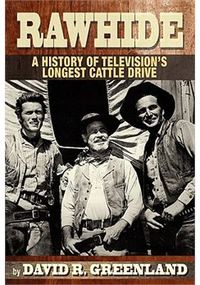 The author delves deeply into the professional and personal backgrounds of producer Warren and actor Fleming, so that you're able to put their creative clashes into a broader perspective. Naturally, that squabbling had an impact on the show in many ways, and Greenland explores them all.
The author delves deeply into the professional and personal backgrounds of producer Warren and actor Fleming, so that you're able to put their creative clashes into a broader perspective. Naturally, that squabbling had an impact on the show in many ways, and Greenland explores them all.
After Warren left, the show changed hands several times. Greenland closely examines how the show changed creatively, and why, under the subsequent show runners.
I found it fascinating reading, but once the author got into the obligatory actor bios and episode guide, I found myself skimming the rest.
You don't have to be a fan of Rawhide to enjoy this book (I've only seen four or five episodes of the show in my life). It's worth reading to learn how this series was developed and produced and how it evolved…and it's fascinating to see just how little TV series production, at least behind-the-scenes, has changed in fifty years.
The Man From Atlantis Returns
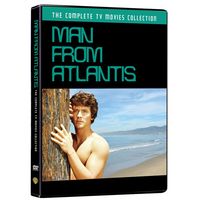 No, it's not another rebooting of an old TV franchise by a desperate network… it's the release of the original series on DVD. Television Obscurities reports that Warner Brothers is releasing the four Man From Atlantis TV movie/pilots as well as the TV series. The movies and the series have not aged well…and are unbelievably awful. The only thing of redeeming value about The Man From Atlantis is Fred Karlin's fantastic score…which I wish an enterprising company like Screen Archives would release on CD.
No, it's not another rebooting of an old TV franchise by a desperate network… it's the release of the original series on DVD. Television Obscurities reports that Warner Brothers is releasing the four Man From Atlantis TV movie/pilots as well as the TV series. The movies and the series have not aged well…and are unbelievably awful. The only thing of redeeming value about The Man From Atlantis is Fred Karlin's fantastic score…which I wish an enterprising company like Screen Archives would release on CD.
Harlequin Screws Authors
Amazon gives authors a 70% royalty when they self-publish an ebook. On the other end of the spectrum, the standard ebook royalty set by most major publishers is 25%, one that the Authors Guild says massively screws authors.
But Harlequin is setting a new low.
Dear Author,
The landscape of digital publishing continues to evolve at a fast pace and Harlequin is at the forefront of this evolution. In 2007 Harlequin was the first publisher to simultaneously publish print and digital editions of our entire frontlist. Since then we have also digitized and brought to market our backlist and now have a current catalogue of over 11,000 ebooks!
The Harlequin brand has always offered an advantage other publishers don't have and this is especially true for ebooks. Our digital marketing efforts focus on building the Harlequin brand to drive the sales of your books through newsletter programs, advertising, search engine marketing, social media properties, the Harlequin website and leading ebook retailers. All this means better search and discoverability by online shoppers and an endorsement of the quality of the read, which is critical in the midst of the online clutter.
Harlequin has been closely monitoring developments in digital publishing, including author compensation. As you know, until now Harlequin's position has been that digital royalty rates as a percentage of cover price is a more transparent way to pay authors than as a percentage of net receipts: authors know exactly how many copies they sold at what price and their compensation is not affected by unspecified costs. Over the past several months we have worked to ensure a smooth transition from the current percentage of cover price calculation to a net receipts calculation while maintaining the same transparency. As such, Harlequin will be amending digital royalty rates.
Effective January 1, 2012, series authors who are actively writing for Harlequin will receive a digital royalty rate of 15% of net digital receipts for each digital unit sold in the English language, United States and Canada, frontlist and backlist. This will include books in Harlequin's digital backlist program, Harlequin Treasury.
Given that these are more favorable terms than those in your existing contract(s), this notification will be considered the amendment to those contract(s). If you wish to maintain the existing terms of the contract(s), please let us know by Friday, July 15th, 2011.
Crooked Letter, Crooked Letter
 I loved Tom Franklin's HELL AT THE BREECH…but couldn't get into his follow-up, SMONK. But I am glad to report that CROOKED LETTER, CROOKED LETTER is terrific, well-deserving of all the acclaim and award nominations it has been receiving. I won't rehash the plot. Suffice it to say, it's about a long-ago incident that involved two teenagers…and a missing girl…and how they are haunted by the consequences well into adulthood. There lots of references to Stephen King in this book, and for good reason. The story is more than a little reminiscent of STAND BY ME…crossed with shades of TO KILL A MOCKINGBIRD (not so much in plot, but in the racial themes and the depiction of a rural community). It is a powerful, entertaining, and thought-provoking book.
I loved Tom Franklin's HELL AT THE BREECH…but couldn't get into his follow-up, SMONK. But I am glad to report that CROOKED LETTER, CROOKED LETTER is terrific, well-deserving of all the acclaim and award nominations it has been receiving. I won't rehash the plot. Suffice it to say, it's about a long-ago incident that involved two teenagers…and a missing girl…and how they are haunted by the consequences well into adulthood. There lots of references to Stephen King in this book, and for good reason. The story is more than a little reminiscent of STAND BY ME…crossed with shades of TO KILL A MOCKINGBIRD (not so much in plot, but in the racial themes and the depiction of a rural community). It is a powerful, entertaining, and thought-provoking book.
Quiet on the Set
I haven't talked much lately about screenwriting on this blog, not because I'm not doing any, but because I'm not allowed to say much about the projects I'm working on (in one case, because I signed a very rigid non-disclosure agreement).
But I can say that good things are happening with GUN MONKEYS, my long-in-the-works feature adaptation of Victor Gischler's terrific novel…and we're both hoping that we're going to be free to share some exciting news with y'all in the very near future. But I can tell you that director Ryuhei Kitamura (Midnight Meat Train, Versus, Azumi) is still attached, as is a world famous movie star with whom I've worked closely on several drafts of the script.
And I've been working on low-budget feature adaptations of four western novels, two each by Bill Crider and Ed Gorman, and financing talks on those have been ongoing with many entities…including a national retailer. That project, in particular, has been a big learning experience for me. It's the first time I have had to get involved in the nitty-gritty of equity financing, distribution and co-production and it's been a real education (which is to say, slow going and extremely frustrating).
I've also had a few disappointments…TV staff gigs that came close, but fell through, and some freelance scripts that were promised to me but didn't happen, all for a number of reasons beyond my control (positions eliminated to cut costs, a showrunner I was working with getting fired, etc). But that's how the business works and I'm used to it.
I wrote a spec pilot recently that has been working well for me as a fresh sample, getting me several "get-to-know-you" meetings at studios and networks around town, but it hasn't led to a TV or movie gig yet. It was based on an unfinished novel which I am now finishing…before I have to start work on my next Monk in just a few weeks.
But all of that is on hold for the next couple of days…I am off to Las Vegas with the family, so behave yourselves here while I am gone.



